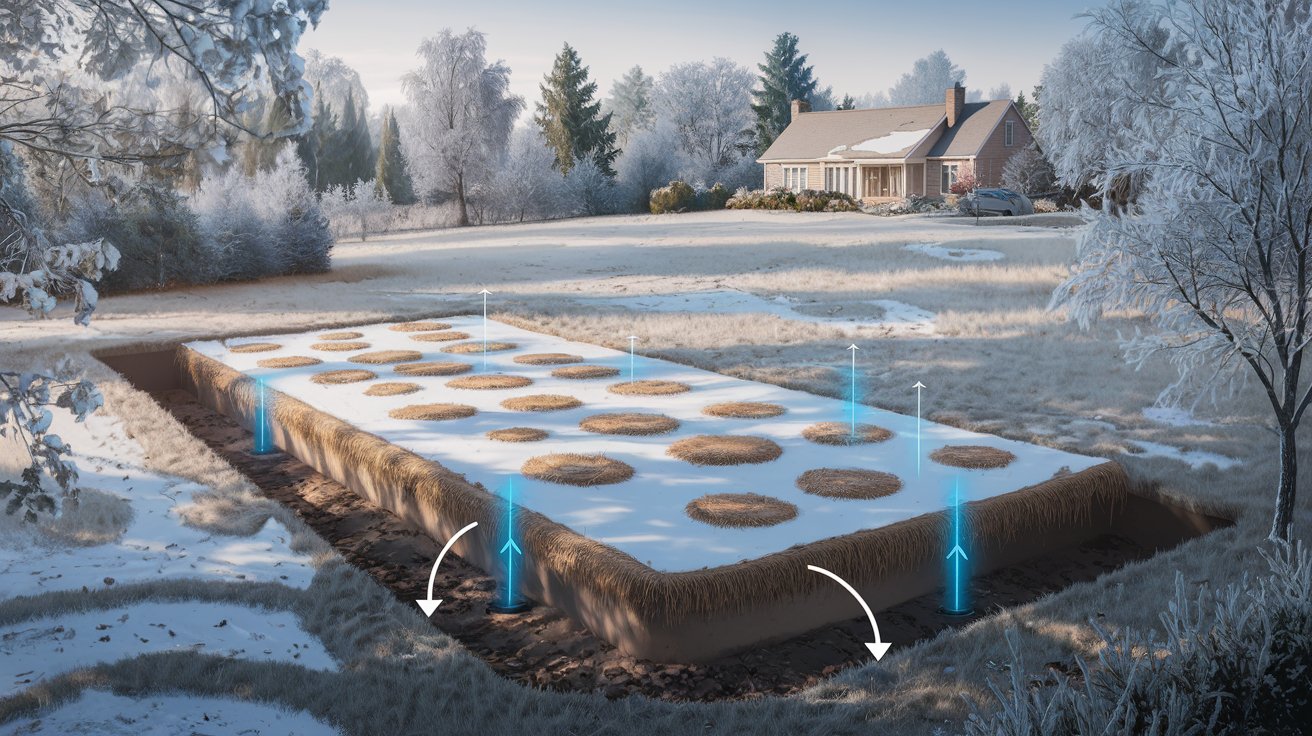Managing drain field during winter is essential to maintaining a functional septic system, especially in snowy or frozen conditions. Cold weather poses unique challenges, such as freezing pipes, compacted soil, and reduced bacterial activity, all of which can compromise your drain field’s efficiency. Without proper care, these issues can lead to costly repairs and environmental hazards.
In this guide, you’ll learn how to protect your drain field during winter, from preventive measures to sustainable practices. By following these tips, you can ensure your septic system remains in peak condition, even in the harshest weather.
Table of Contents
- Understanding the Impact of Winter on Drain Fields
- Essential Tips for Managing Your Drain Field During Winter
- Best Practices for Long-Term Drain Field Care
- Keeping Your Drain Field Winter-Ready
- Septic Permit Links by State
Understanding the Impact of Winter on Drain Fields
Winter can be particularly harsh on septic systems, and your drain field is no exception. Freezing temperatures and heavy snow can disrupt its functionality, leading to long-term damage if not addressed promptly. Understanding how winter affects your drain field is the first step toward effective maintenance.
Why Winter Poses Risks to Your Drain Field
- Freezing Temperatures: When temperatures drop, the water in your septic pipes and drain field can freeze, causing blockages that prevent proper drainage. This can lead to wastewater backups inside your home.
- Snow Compaction: Snow covering the drain field might seem harmless, but heavy compaction from vehicles or foot traffic can compress the soil. This reduces the soil’s ability to aerate, which is critical for treating wastewater.
- Reduced Bacterial Activity: Cold weather slows down the bacteria responsible for breaking down waste. Without sufficient bacterial activity, solids may accumulate in the septic tank and overflow into the drain field, causing clogs.
Signs of Trouble in a Winterized Drain Field
- Slow Draining Fixtures: If sinks, toilets, or tubs are draining slowly, it could indicate a blockage in the system caused by freezing.
- Pooling Water or Ice: Visible water or ice above the drain field is a clear sign of improper drainage, often due to frozen or compacted soil.
- Foul Odors: Unpleasant smells near your drain field or septic tank can signal that waste isn’t being processed correctly, often due to cold weather hindrances.
By recognizing these risks and warning signs, you can take proactive measures to prevent winter-related issues with your drain field. The next section will guide you through essential tips for keeping your drain field functional during the cold months.
Essential Tips for Managing Your Drain Field During Winter
Proper maintenance and preventive measures are key to ensuring your drain field remains operational during the winter months. By implementing these tips, you can protect your septic system from freezing and other cold-weather challenges.
Preventing Freezing in Your System
- Insulate with Mulch or Straw: Before the first freeze, cover your drain field with a layer of mulch, straw, or leaves. This natural insulation helps trap heat in the soil and prevents freezing.
- Avoid Snow Compaction: Limit vehicle or heavy foot traffic over the drain field. Compacted snow loses its insulating properties, exposing the soil to colder temperatures.
- Use Septic-Safe Additives: Additives designed for winter use can boost bacterial activity, ensuring waste continues to break down effectively even in cold conditions.
Routine Maintenance Tasks for Winter Protection
- Inspect Regularly for Ice Buildup: Periodically check your drain field for signs of ice accumulation or pooling water. Early detection can help you address problems before they escalate.
- Clear Snow Gently: If you need to remove snow from your drain field, do so carefully to avoid damaging the soil or underlying pipes. Use a shovel instead of heavy machinery.
- Repair Leaky Fixtures: Leaks from faucets or toilets can overload your septic system, especially in winter when the drain field is less efficient. Fix any leaks to prevent unnecessary strain.
Maintain Proper Water Usage
Spread out water usage throughout the day to avoid overloading the system. For example, stagger laundry loads and dishwashing to give the drain field time to process wastewater effectively.
Best Practices for Long-Term Drain Field Care
While winter-specific strategies are crucial, adopting sustainable, year-round practices ensures your drain field remains healthy and functional through every season. These practices help you prepare for winter and reduce the risk of long-term damage to your septic system.
Plan Ahead for Winter
- Schedule Professional Inspections in Fall: Before winter arrives, hire a professional to inspect your septic system. They can identify potential issues, such as clogs or leaks, and recommend preventive measures.
- Ensure Proper Grading: Make sure the area around your drain field is graded to prevent water from pooling. Excess moisture can freeze and create blockages during winter.
- Upgrade to a Winter-Ready System: If you live in a region with severe winters, consider installing insulated pipes or a septic system designed for cold climates.
Sustainable Solutions for Year-Round Drain Field Health
- Plant Grass or Ground Cover: Vegetation over your drain field acts as a natural insulator, protecting the soil from extreme temperatures. Choose plants with shallow roots to avoid damaging pipes.
- Practice Water Efficiency: Use water wisely to reduce strain on your septic system. Install low-flow fixtures and spread out high-water activities, like laundry, to give the system time to process wastewater.
- Limit Chemical Use: Harsh chemicals, such as bleach or drain cleaners, can harm the bacteria in your septic system. Opt for septic-safe cleaning products to maintain a healthy balance.
Be Mindful of Drain Field Usage
Divert downspouts and runoff away from the drain field to prevent excess water from saturating the soil.
Avoid parking vehicles or placing heavy objects on the drain field. Compaction can damage pipes and hinder wastewater treatment.
Keeping Your Drain Field Winter-Ready
Managing your drain field during winter is essential for maintaining a healthy and efficient septic system. Cold weather can introduce unique challenges, from freezing pipes to reduced bacterial activity, but with the right preventive measures, you can avoid costly repairs and ensure optimal performance.
Key Takeaways
- Prevent Freezing: Insulate your drain field with mulch or straw, and avoid snow compaction to retain soil warmth.
- Routine Maintenance: Regularly inspect for ice buildup, clear snow gently, and repair any leaky fixtures to prevent overloading the system.
- Sustainable Practices: Plant shallow-rooted vegetation, practice water efficiency, and use septic-safe products to maintain a healthy system year-round.
- Plan Ahead: Schedule inspections before winter, ensure proper grading, and consider upgrading to a winter-ready septic system if necessary.
By implementing these strategies, you can protect your drain field from winter-related issues and set the stage for long-term success.










